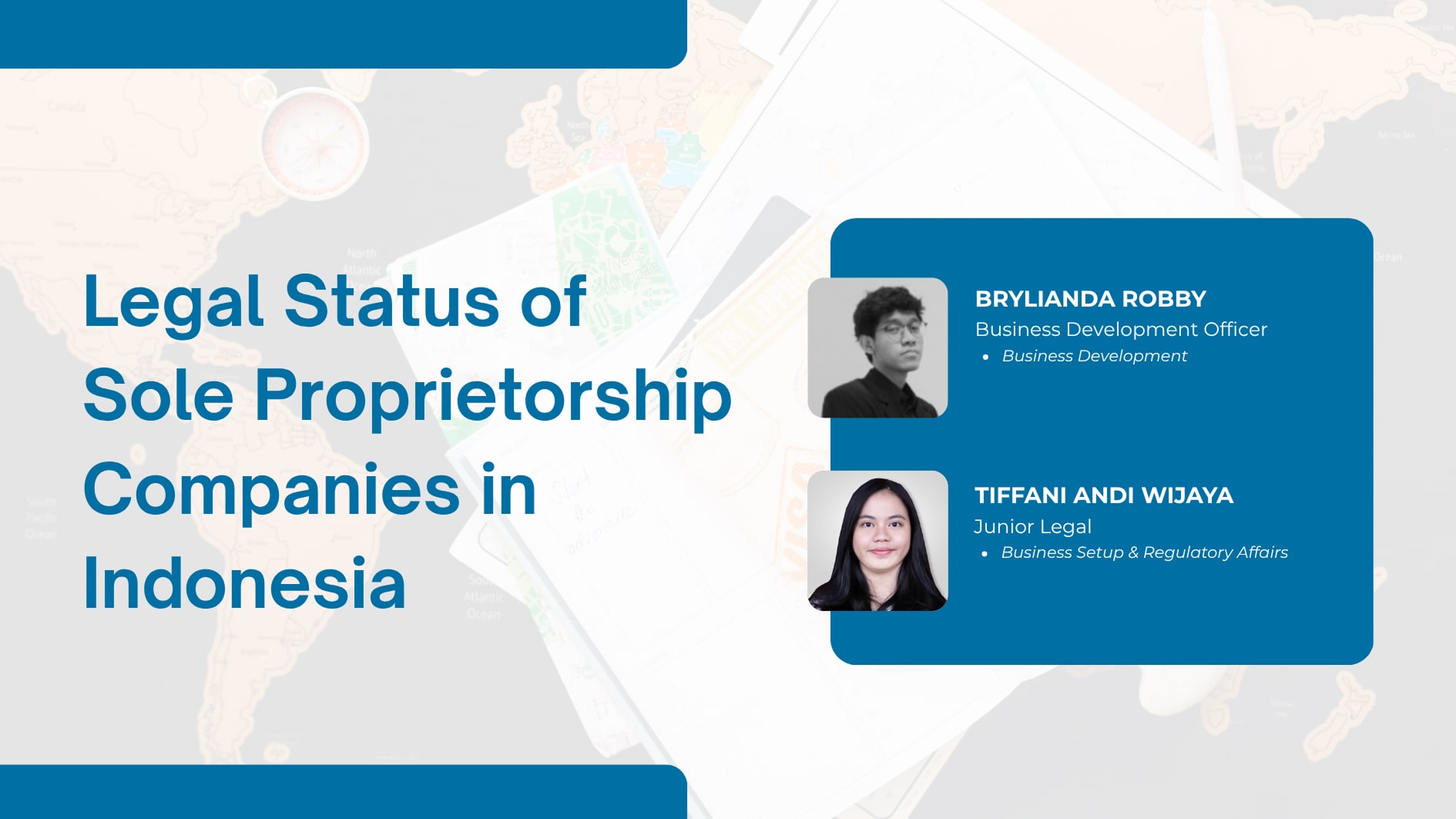In general, a Limited Liability Company (Perseroan Terbatas or PT) in Indonesia is established by two (2) or more individuals through a notarial deed in the Indonesian language (Article 7 paragraph 1 of the Company Law). However, it is now possible to establish a company with only one (1) individual, known as a Sole Proprietorship Company (Perseroan Perorangan or PP), where the sole individual acts as both the shareholder and the director, provided they meet the criteria of a micro or small enterprise (Article 153A paragraph (1) of the Omnibus Law on Job Creation). The purpose of the Sole Proprietorship Company is to facilitate ease of business establishment and to contribute to job creation.
Criteria for Micro and Small Enterprises
- Micro Enterprises:
Defined by having a maximum business capital of IDR 1,000,000,000 (one billion Rupiah), excluding land and buildings used for business purposes, or having a maximum annual revenue of IDR 2,000,000,000 (two billion Rupiah). (Article 35 paragraph (3) letter a and paragraph (5) letter a of Government Regulation No. 7 of 2021) - Small Enterprises:
Defined by having business capital of more than IDR 1,000,000,000 (one billion Rupiah) and up to IDR 5,000,000,000 (five billion Rupiah), excluding land and buildings used for business purposes, or having annual revenue exceeding IDR 2,000,000,000 (two billion Rupiah) and up to IDR 15,000,000,000 (fifteen billion Rupiah). (Article 35 paragraph (3) letter b and paragraph (5) letter b of Government Regulation No. 7 of 2021)
As explained in Article 6 of Government Regulation No. 8 of 2021, a Sole Proprietorship Company (PP) must be established by an Indonesian citizen by submitting a written declaration in the Indonesian language and must fulfill the following requirements:
- Must be at least 17 (seventeen) years of age;
- Must be legally competent;
- The Sole Proprietorship Company obtains legal entity status upon registration with the Minister and issuance of an electronic certificate of registration;
- Once legal status is obtained, the company will be publicly announced by the Minister on the official website of the Directorate General responsible for general legal administration.
A Sole Proprietorship Company is established without a notarial deed by an individual (not a legal entity) and the individual’s liability is limited to the capital invested in the company. If it is established by more than one person or by a legal entity, it no longer qualifies as a Sole Proprietorship Company and will be considered a Limited Liability Company (Perseroan Terbatas). (Article 9 of Government Regulation No. 8 of 2021).
The name of a Sole Proprietorship Company must not be based on the personal name of the founder but should be a unique corporate name. Therefore, it is important to ensure the availability of the proposed company name prior to registration.
In addition, a Sole Proprietorship Company features asset separation similar to conventional Limited Liability Companies. It is categorized as a legal entity, as stipulated in Article 3 paragraph (1) of the Company Law (UUPT).
Requirements:
- Established by one (1) individual acting as the sole Shareholder and Director, with no Commissioner;
- Engaged in micro and small business activities;
- The founder must prepare a statement of establishment;
- Registration of the Sole Proprietorship Company (Perseroan Perorangan) is conducted electronically through the Ministry of Law and Human Rights of the Republic of Indonesia;
- Obtain a Tax Identification Number (NPWP) for the Sole Proprietorship Company;
- Apply for a Business Identification Number (NIB) and business license for the Sole Proprietorship Company.
The authorized capital of a Sole Proprietorship Company is determined based on the founder’s financial capacity. The rules regarding paid-up capital follow the provisions of the Company Law, and proof of capital payment must be submitted electronically to the Ministry of Law and Human Rights. The proof of payment must be submitted no later than 60 days after the Statement of Establishment is completed.
Establishment Requirements :
- Founder’s ID card (KTP);
- Founder’s Tax ID Number (NPWP);
- Address of the Sole Proprietorship Company;
- Completion of the Establishment Form.
(A Sole Proprietorship Company is established through a Statement Letter, whereas a Limited Liability Company requires a Notarial Deed.)
The information required to register a Sole Proprietorship Company (PP) as stipulated in Article 6 paragraph (1) of Government Regulation No. 8 of 2021 includes:
- Name and domicile of the Sole Proprietorship Company;
- Duration of the company’s existence;
- Objectives, purposes, and business activities of the Sole Proprietorship Company;
- Amount of authorized capital, issued capital, and paid-up capital;
- Nominal value and total number of shares;
- Address of the Sole Proprietorship Company;
- Full name, place and date of birth, occupation, address, national identification number (NIK), and tax identification number (NPWP) of the founder, who also acts as the director and shareholder of the Sole Proprietorship Company.
If you are looking to establish a Sole Proprietorship Company, a Limited Liability Company, or another business entity, A&C is ready to assist you with the process. Let’s start with a consultation!
*Disclaimer: This article is for general information only and does not constitute legal advice. We accept no liability for any consequences arising from its use. Unauthorized use or reproduction is prohibited and may result in legal action.
Sources :
- Government Regulation No. 7 of 2021 on the Facilitation, Protection, and Empowerment of Cooperatives and Micro, Small Enterprises;
- Government Regulation No. 8 of 2021 on Authorized Capital of Limited Liability Companies and the Registration of Establishment, Amendment, and Dissolution of Companies Meeting the Criteria for Micro and Small Enterprises;
- Law No. 11 of 2020 on Job Creation;
- Law No. 40 of 2007 on Limited Liability Companies.





